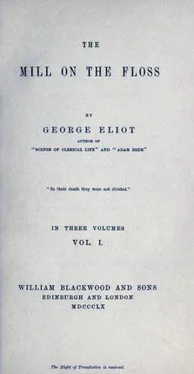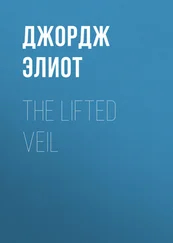Presently Stephen observed a vessel coming after them. Several vessels, among them the steamer to Mudport, had passed them with the early tide, but for the last hour they had seen none. He looked more and more eagerly at this vessel, as if a new thought had come into his mind along with it, and then he looked at Maggie hesitatingly.
"Maggie, dearest," he said at last, "if this vessel should be going to Mudport, or to any convenient place on the coast northward, it would be our best plan to get them to take us on board. You are fatigued, and it may soon rain; it may be a wretched business, getting to Torby in this boat. It's only a trading vessel, but I dare say you can be made tolerably comfortable. We'll take the cushions out of the boat. It is really our best plan. They'll be glad enough to take us. I've got plenty of money about me. I can pay them well."
Maggie's heart began to beat with reawakened alarm at this new proposition; but she was silent, — one course seemed as difficult as another.
Stephen hailed the vessel. It was a Dutch vessel going to Mudport, the English mate informed him, and, if this wind held, would be there in less than two days.
"We had got out too far with our boat," said Stephen. "I was trying to make for Torby. But I'm afraid of the weather; and this lady — my wife — will be exhausted with fatigue and hunger. Take us on board — will you? — and haul up the boat. I'll pay you well."
Maggie, now really faint and trembling with fear, was t aken on board, making an interesting object of contemplation to admiring Dutchmen. The mate feared the lady would have a poor time of it on board, for they had no accommodation for such entirely unlooked-for passengers, — no private cabin larger than an old-fashioned church-pew. But at least they had Dutch cleanliness, which makes all other inconveniences tolerable; and the boat cushions were spread into a couch for Maggie on the poop with all alacrity. But to pace up and down the deck leaning on Stephen — being upheld by his strength — was the first change that she needed; then came food, and then quiet reclining on the cushions, with the sense that no new resolution could be taken that day. Everything must wait till to-morrow. Stephen sat beside her with her hand in his; they could only speak to each other in low tones; only look at each other now and then, for it would take a long while to dull the curiosity of the five men on board, and reduce these handsome young strangers to that minor degree of interest which belongs, in a sailor's regard, to all objects nearer than the horizon. But Stephen was triumphantly happy. Every other thought or care was thrown into unmarked perspective by the certainty that Maggie must be his. The leap had been taken now; he had been tortured by scruples, he had fought fiercely with overmastering inclination, he had hesitated; but repentance was impossible. He murmured forth in fragmentary sentences his happiness, his adoration, his tenderness, his belief that their life together must be heaven, that her presence with him would give rapture to every common day; that to satisfy her lightest wish was dearer to him than all other bliss; that everything was easy for her sake, except to part with her; and now they never would part; he would belong to her forever, and all that was his was hers, — had no value for him except as it was hers. Such things, uttered in low, broken tones by the one voice that has first stirred the fibre of young passion, have only a feeble effect — on experienced minds at a distance from them. To poor Maggie they were very near; they were like nectar held close to thirsty lips; there was, there must be, then, a life for mortals here below which was not hard and chill, — in which affection would no longer be self-sacrifice. Stephen's passionate words made the vision of such a life more fully present to her than it had ever been before; and the vision for the time excluded all realities, — all except the returning sun-gleams which broke out on the waters as the evening approached, and mingled with the visionary sunlight of promised happiness; all except the hand that pressed hers, and the voice that spoke to her, and the eyes that looked at her with grave, unspeakable love.
There was to be no rain, after all; the clouds rolled off to the horizon again, making the great purple rampart and long purple isles of that wondrous land which reveals itself to us when the sun goes down, — the land that the evening star watches over. Maggie was to sleep all night on the poop; it was better than going below; and she was covered with the warmest wrappings the ship could furnish. It was still early, when the fatigues of the day brought on a drowsy longing for perfect rest, and she laid down her head, looking at the faint, dying flush in the west, where the one golden lamp was getting brighter and brighter. Then she looked up at Stephen, who was still seated by her, hanging over her as he leaned his arm against the vessel's side. Behind all the delicious visions of these last hours, which had flowed over her like a soft stream, and made her entirely passive, there was the dim consciousness that the condition was a transient one, and that the morrow must bring back the old life of struggle; that there were thoughts which would presently avenge themselves for this oblivion. But now nothing was distinct to her; she was being lulled to sleep with that soft stream still flowing over her, with those delicious visions melting and fading like the wondrous aerial land of the west.
When Maggie was gone to sleep, Stephen, weary too with his unaccustomed amount of rowing, and with the intense inward life of the last twelve hours, but too restless to sleep, walked and lounged about the deck with his cigar far on into midnight, not seeing the dark water, hardly conscious there were stars, living only in the near and distant future. At last fatigue conquered restlessness, and he rolled himself up in a piece of tarpaulin on the deck near Maggie's feet.
She had fallen asleep before nine, and had been sleeping for six hours before the faintest hint of a midsummer daybreak was discernible. She awoke from that vivid dreaming which makes the margin of our deeper rest. She was in a boat on the wide water with Stephen, and in the gathering darkness something like a star appeared, that grew and grew till they saw it was the Virgin seated in St. Ogg's boat, and it came nearer and nearer, till they saw the Virgin was Lucy and the boatman was Philip, — no, not Philip, but her brother, who rowed past without looking at her; and she rose to stretch out her arms and call to him, and their own boat turned over with the movement, and they began to sink, till with one spasm of dread she seemed to awake, and find she was a child again in the parlor at evening twilight, and Tom was not really angry. From the soothed sense of that false waking she passed to the real waking, — to the plash of water against the vessel, and the sound of a footstep on the deck, and the awful starlit sky. There was a moment of utter bewilderment before her mind could get disentangled from the confused web of dreams; but soon the whole terrible truth urged itself upon her. Stephen was not by her now; she was alone with her own memory and her own dread. The irrevocable wrong that must blot her life had been committed; she had brought sorrow into the lives of others, — into the lives that were knit up with hers by trust and love. The feeling of a few short weeks had hurried her into the sins her nature had most recoiled from, — breach of faith and cruel selfishness; she had rent the ties that had given meaning to duty, and had made herself an outlawed soul, with no guide but the wayward choice of her own passion. And where would that lead her? Where had it led her now? She had said she would rather die than fall into that temptation. She felt it now, — now that the consequences of such a fall had come before the outward act was completed. There was at least this fruit from all her years of striving after the highest and best, — that her soul though betrayed, beguiled, ensnared, could never deliberately consent to a choice of the lower. And a choice of what? O God! not a choice of joy, but of conscious cruelty and hardness; for could she ever cease to see before her Lucy and Philip, with their murdered trust and hopes? Her life with Stephen could have no sacredness; she must forever sink and wander vaguely, driven by uncertain impulse; for she had let go the clue of life, — that clue which once in the far-off years her young need had clutched so strongly. She had renounced all delights then, before she knew them, before they had come within her reach. Philip had been right when he told her that she knew nothing of renunciation; she had thought it was quiet ecstasy; she saw it face to face now, — that sad, patient, loving strength which holds the clue of life, — and saw that the thorns were forever pressing on its brow. The yesterday, which could never be revoked, — if she could have changed it now for any length of inward silent endurance, she would have bowed beneath that cross with a sense of rest.
Читать дальше












